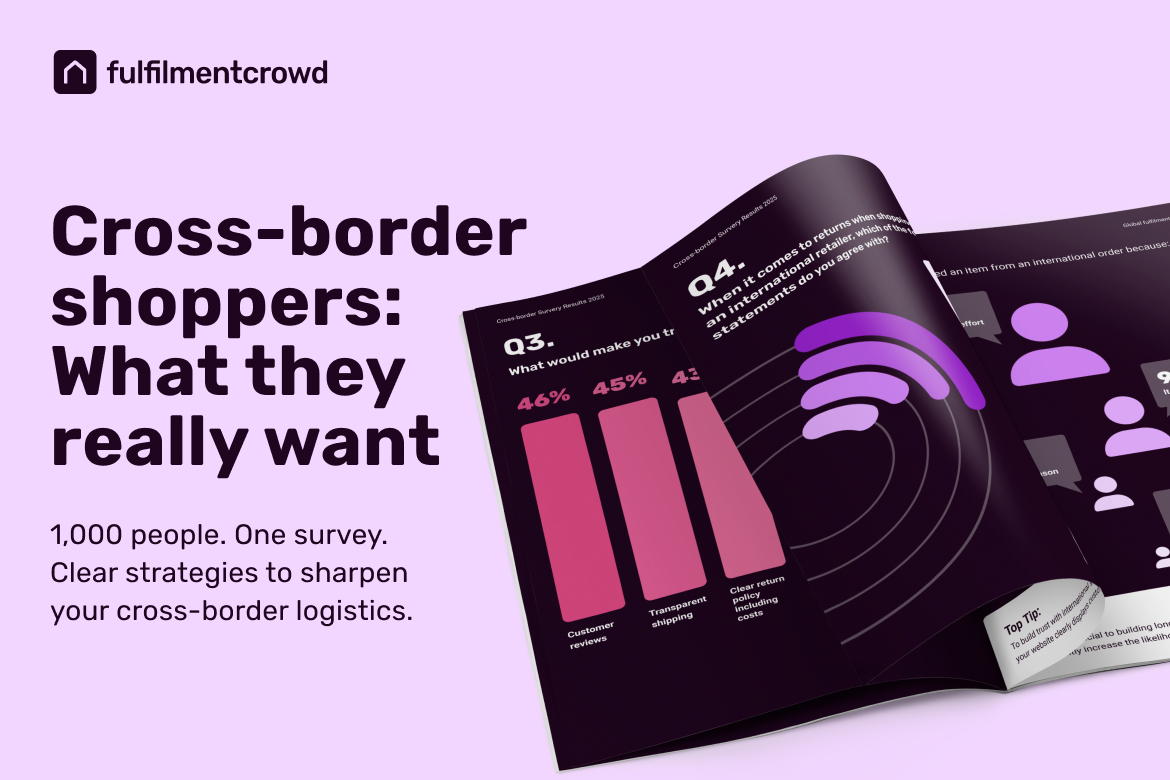Why German e-commerce brands are missing out on global customers – and how to change that
Written by
Editorial TeamPublished on
Explore why German e-commerce brands are missing out on global customers, and discover how overcoming common myths about international shipping could unlock massive growth opportunities (Ad).

Commercial collaboration
Germany is home to some of the most innovative eCommerce brands Europe has to offer. From premium fashion labels to leading consumer technology, German products boast an international reputation for quality and reliability. Yet despite this, many German online retailers are surprisingly hesitant to take business beyond their home market.
While there’s healthy demand for German products across the EU, UK, and even further afield, many businesses are reluctant to ship internationally. In fact, cross-border sales accounted for only 5% of total German eCommerce revenue in 2023.
So, what’s holding German brands back? To better understand the main concerns around cross-border trade, global fulfilment provider fulfilmentcrowd analysed internal and external data to help companies navigate the most common challenges of international expansion.
The numbers don’t lie: A cross-border snapshot
For many brands, taking the leap to go international can be daunting. Whether navigating customs regulations or managing returns cross-border, there are many reasons that businesses decide to stay within their domestic markets.
When it comes to German eCommerce brands, data suggests they’re a little more reluctant than other European countries to ship their products internationally, especially outside of the EU.
fulfilmentcrowd’s internal client data paints this picture of attitudes towards international shipping across Europe:
- 81% of their German clients have shipped to other EU countries
- By contrast, 100% of Dutch clients actively sell to other EU nations
- 56% of UK clients ship to the EU, but just 26% of EU clients send orders to the UK
- Across the EU, the average is higher than Germany’s international shipping numbers, with 88% already trading across borders
But it’s the broader eCommerce landscape that tells the true story. Exports make up only about a quarter of cross-border trade, and German brands focus largely on close neighbours like Austria, the Netherlands, and France.
For businesses willing to take the leap, targeting the gap further afield can result in significant growth – if done correctly.
What’s stopping German retailers from going global?
fulfilmentcrowd’s research highlights some of the fears experienced by German brands when it comes to international growth, with Head of EU Sales Patrick Vonk explaining: “When I speak with German clients, the main reasons for hesitating with international shipping are fears of complex regulations and tax implications.
“In my experience, most people overestimate the complexity and miss out on significant revenue potential.”
Here are some of the concerns that have appeared on a repeat basis:
- Customs declarations and duties
The concern: “Customs paperwork is complicated, especially outside of the EU.”
The reality: A reliable fulfilment partner can automate the process, ensuring compliance while freeing up time for your teams.
- Shipping costs and delivery times
The concern: “International delivery is slow and expensive.”
The reality: Placing products closer to customers with local warehousing can slash delivery times and costs. According to JUSDA, regional fulfilment can reduce:
- Parcel delivery costs by 12%
- Express shipping costs by 24%
- Overall logistics costs by 15%
- Cross-border concerns
The concern: “Handling returns internationally is messy, slow, and costly.”
The reality: Local returns handling improves customer satisfaction, reduces emissions (24 million metric tons of CO2 emissions are attributed to eCommerce each year), and lightens the load on your returns team.
- Customer support in multiple languages
The concern: “Language barriers will frustrate customers and damage our brand.”
The reality: Localised support, multilingual tools, and AI customer agents help your business deliver smooth, professional customer service without adding friction to your operations.
Why going global is worth it
Patrick Vonk puts it simply: “You gain access to a much larger customer base, grow brand visibility, and increase sales. And, if demand drops in one market, others can help fill the gap.”
Without expansion:
- Limited customer base
- Vulnerability to local demand fluctuations
- Little brand recognition beyond regional borders
With expansion:
- Larger pool of potential customers
- Diversified revenue streams
- Potential brand growth in multiple regions
Patrick continues: “One great example of successful international fulfilment from the DACH region is Swiss fragrance brand Gisada.
“Working with fulfilmentcrowd, they’ve been able to optimise their logistics to efficiently manage both B2B and DTC orders across Europe, including an integration with Amazon.
“Their expansion into new markets was seamless, without needing to handle complex shipping or varying national regulations internally.”
Expert tips for German brands eyeing international growth
So, how do German brands improve their chances of success in global markets? For Patrick, it’s all about localisation: “My top tip for any business considering cross-border expansion is finding local experts for each target market, as they’ll help you navigate regulations effectively.
“It’s equally important to not just think about logistics, and to think beyond shipping. Just because you speak the language doesn’t mean your entire strategy will translate.
“Every market is different, so simply converting your German campaign into English won’t cut it. If hiring a full-time marketer isn’t an option, consider outsourcing international campaigns to freelancers.”
To summarise:
- Find local experts for each market to navigate regulations
- Think beyond logistics – marketing and customer experience matter just as much
- Localise everything, adapting your tone, imagery, payment options, and product messaging to each country
Building your cross-border growth plan
If you’re ready to take the leap, here’s a simple roadmap to help you move from domestic-only to a global presence.
- Identify target markets: Start with markets where you already see interest, whether it’s through web traffic, social media engagement, or customer enquiries.
- Check regulations early: Look into VAT requirements, customs rules, and product compliance for each country to avoid any nasty surprises.
- Localise the experience: As previously mentioned, it’s vital to adapt your website for language, currency, payment methods, and cultural nuances.
- Optimise your logistics: Consider regional warehousing to slash shipping times and reduce delivery costs.
- Test and scale: Start with one or two markets, measure KPIs, and refine your international strategy before expanding further.
- Promote strategically: Use targeted ads, local influencers, and regional expertise to grow your visibility in new markets.
Extra data: What do UK shoppers value most from international brands?
Further figures from fulfilmentcrowd highlight what UK customers expect when they buy from international brands.
With this data, German brands can identify the most important areas to target if they’re considering global expansion, especially to the UK.
Some standouts from the survey include:
- 40% said high shipping costs were the main deterrent
- 46% said customer reviews were key to building trust
- 45% valued transparent shipping policies
- 43% prioritised clear return policies
- 79% had purchased from an international seller in the past 12 months
You can explore the full set of fulfilmentcrowd’s eCommerce survey results for a deeper look at their international shopper data.
What are the most asked questions about international fulfilment?
If your business is considering global expansion, you’ll no doubt have questions.
Here are the answers to the questions being asked by German brands…
How long does it take to implement an international fulfilment setup?
This typically takes between two and four weeks, depending on your product type, order volume, and target market.
Which markets are easiest to enter first?
Besides EU neighbours like France and Benelux, there’s strong growth potential in Southern Europe and the UK. Just remember to localise your marketing and products for your region of choice.
Do I need a warehouse abroad to ship internationally?
It’s not absolutely necessary, but local warehousing does provide some significant benefits. Reduce shipping times and costs for regular shipments are among the key perks, alongside an easier returns process for you and your customers.
Should I translate my online store?
Without a doubt, as a German site will deter international buyers. But don’t just translate directly – localise your content, currency, payment options, and tone. Seek expert help to get you up and running if you’re unsure.
Do I need a separate VAT ID for each country?
It depends on your sales volume per country (thresholds apply). For any VAT-related enquiries, a specialist fulfilment provider or tax consultant can advise you on best practices.
What do I need to know about UK customs after Brexit?
Customs and import rules look different for shipping into the UK from the EU following Brexit. By using a fulfilment provider, much of the new customs and import processes can be automated to ensure compliance.
The bottom line
The barriers to cross-border eCommerce for many German brands are more perception than they are reality.
Brands that embrace international expansion don’t just get the opportunity to attract new customers; they build resilience, market diversity, and a stronger brand identity in an increasingly interconnected marketplace.
So, if your German eCommerce brand is still focused solely on domestic markets, now is the time to think bigger. More loyal customers could be waiting just a border away.
More about fulfilmentcrowd
fulfilmentcrowd is a global fulfilment provider that helps high-growth, technology-driven brands scale across multiple sales channels. Trusted by more than 250 brands worldwide, fulfilmentcrowd combines industry expertise with powerful logistics capabilities to deliver fast, flexible, and scalable fulfilment solutions.
With 30+ years of industry experience, proven implementation methods, and a proprietary software platform, fulfilmentcrowd supports both DTC and B2B orders via a growing network of international fulfilment centres.
As a tech-first, private equity-backed business, fulfilmentcrowd is built for scale, helping ambitious brands grow revenue across global markets through fast delivery, reduced costs, and outstanding customer experiences.
***


